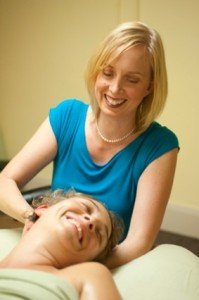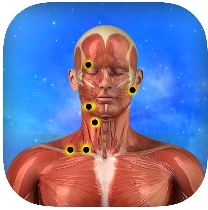
I have had my own practice very since I graduated from massage school in 1998. Now I live in Ashland, OR and run my own solo practice business.
I run a unique practice where I charge by the session and not by the hour. I only see three clients in a day and I work five days a week. I set aside two full hour for the client, and a half an hour break for myself in between. The two hours for the client allow time to talk, 1.5-1.75 hours of hands-on work, and time for the client to get up without either of us feeling rushed.
I also provide NCTBMT approved continuing education to other massage therapists. I offer both weekend CEUs and an ongoing mentorship program that meets one to two times a month.
2. Tell us why you chose to go into massage and at what point in your life did you decide to do so? What were you doing at the time? Where did you first hear about the massage career? What factors influenced your decision? What were you looking to get out of this decision?
My first inspiration to become a massage therapist came at the age of fourteen. My mother’s friend was having problems with her neck and I asked her if she wanted me to massage it. Afterwards, she turned her neck back and forth and said, “Hey, you could do that for a living!” I replied, “Maybe if I have a mid-life crisis and hate my career, I will get certified and do that for a while.”
Eleven years later, after earning my college degree and landing a job in hotel management, I asked myself, “Why do I have to be in mid-life and in crisis to do something I think I will love?” So I gave myself permission to re-evaluate my life at the age of twenty-five instead of waiting until a mid-life crisis.
I changed to a job that would let me go to massage school at night. I have no regrets about leaving the perceived stability of a corporate world job to take the risk of stepping out on my own. It was a leap, but a leap I was glad I took
3. What were some of your questions and concerns before further pursuing your massage therapy goals? Talk about concerns with school and the profession itself.
In an odd way, I wasn’t concerned about the profession itself. I always had an entrepreneurial spirit and even started my own freelance photography business at the age of sixteen. Because I had experience with success doing something I loved in the past, I didn’t question that I could make a living with massage knowing I would be putting my mind and heart into it.
A couple of things that I should have been concerned about was educating the populations about what therapeutic massage was really about. When I began my practice in New Orleans in 1998, licensure had only been around for six years and there was some old stereotypes about ‘massage parlors’ that I had to overcome as a young therapist entering the field.
I believe the perceptions of massage had changed a lot over the past decade, but it is something that therapist need to keep in mind, depending on what part of the country you are from and each person’s culture around touch.
4. What is your specialty and what are the top three contributing factors to your success today?
I specialize in eclectic and intuitive massage. The top three factors that have contributed to my success:
1) Always keep learning. I have studied all over the world and continue to learn. Let the bodies teach you. Let the bodywork you receive teach you. Let your mistake teach you.
2) I love to travel and my passion for travel has brought me to study all over the world. This has made my sessions very unique. It has also make my continuing education classes very creative and fun.
3) I have actively pursued my own healing path. My truth is that a good portion of helping professionals are wounded healers, whether they be conscious of it or not. I recognize that I do have my own wounds and my own willingness to address my own shadow, little by little, helps to improve the work I do. I am far from healed, but I feel that even my own ability to accept this about myself makes me a better healing helper.
5. What do you like about your specialty? What do you like about what you do in general as a career? Why?
I like working intuitively and eclectically because it helps me to express my creativity. In general, bodies and people fascinate me.
6. What do you not like about what you do? Why?
I often do not like the logistics of paperwork and the nitty gritty of balancing things financially. When I work with automobile insurance claims, I do not like the some of the hoop-jumping that seems to come with it.
I am willing to do it for existing clients, but if I were to run an insurance-based practice, I think I would burn out fast, not from the massage, but from the bureaucracy.
7. If there were three things you could change about your work or the industry as a whole what would they be? Why would you change them? What would you change them to?
1) I would like the industry to be more collaborative and less competitive. I believe there is enough work out there for therapist who are truly passionate. I think it just takes more education the public and collaborating to bring each other’s skills forward. Clients are not commodities to possess, they are people to support and help. If referring them to another therapist will serve the healing process, I think a good therapist would do is. Unfortunately, I do not think this happens often enough.
2) The state to state requirements for licensure can be different and this can be truly frustrating. I had been doing massage for ten years, had over 1700 hour in training, and when I moved to Oregon (which requires 500 hours), I needed to go back to school to get 53 extra hours in ‘health sciences’ courses. This delayed my licensure by five months and required substantial financial investment.
3) In the name of creating legitimacy, I think our industry had become a bit too strict. I would either like to see more leniency to consider real-life experience, or a licensure that is accepted throughout the United States.
8. How long do you plan to practice and what do you plan to do after?
I have been practicing for fifteen years and I do not plan on stopping doing massage any time soon. I do have a vision of switching more towards teaching and mentoring and possibly opening my own center in the next few years.
In this center I would help other therapist to grow, learn and bring their hidden gifts forward. Even if my path moves more away from doing physical work, I imagine I will probably be involved with the healing arts in some way, whether physical, energetic or in the emotional realm.
9. Do you currently have another job or business whether full time or part time? Tell us a bit more about it and how you are able to juggle that with your massage career?
I have a massage practice and I also teach continuing education. When I am presenting continuing education, I reduce my client load so that I do not over extend myself.
10. What are some mistakes you made in your career pursuit that you’d like to warn other students about so they can learn from your experience and avoid it?
If you get a call from a client and you get an odd feeling, don’t take them. Your gut feelings are normally right. I have taken clients that I got an odd or creepy feeling from. I took them either because I wanted to be ‘nice’ or because my practice was growing and I needed the money.
In most of these cases, that odd feeling ended up surfacing later, either with boundary issues or other situations. Trust what you feel and be willing to say ‘no’ to people.
11. What would you advice someone who is looking at massage therapy schools? What do you recommend they look for and how? How do you recommend they determine whether the school is the right one for them?
Step one: Go and visit the school. Ask them if you can spend a day sitting on on classes. Talk with current students and graduated students. Receive from their graduates and see if you like the massage you get.
If possible, try to enroll in a school that is still local and personal and not owned by a vocational-tech chain. I am not saying can’t get a good education from places like this, but massage is a personalized service and learning from owners who still have a personal invest in the school just makes sense.
12. What do you recommend for someone who wants to go to massage school but cannot afford it?
See if there are loans possible. If you really want it, start to save. Look around for scholarships. Fund rase for yourself. If may sound silly, but fund raising for school will give you experience of what it is like to put yourself out there and get some marketing experience. Ask if there are any work-trade options at your school. If you want it, go for it, but you may need to be creative.
13. What are your three biggest points of advice for an aspiring massage therapist today? What should they do/not do? What should they think about and consider?
1) Be honest with yourself and your motivations for getting into this career. If your motivation money alone, you should probably try another profession. You really have to like people and like touching people or you will not last in this profession.
2) Keep in mind that it takes a while to establish a practice after you graduate from school. Plan accordingly with your finances and other jobs because the first two years can be challenging.
3) Don’t let me words of caution or the words of others keep you from doing something you think you will love. It is is in your heart to do this work, go for it!
14. Any open thoughts / comments – anything else that you’d like to share about yourself, the massage industry, profession, future, etc? If nothing, make one prediction for the future of massage?
Although I think it is great that you can get ideas and inspirations about massage from the internet, I think the movement towards getting CE on-line is a slipper slop. Don’t get me wrong, YouTube is great for inspiration and I actually have a channel myself (https://www.youtube.com/user/CoCreativeHealing).
However, there is nothing like having a great in-person class to improve your skills and inspire your practice. A great teacher will give you feedback on body mechanics that a video class cannot. Your partners will give you feedback about pressure while the teach is there to guide and correct you.
This is invaluable. Plus, you get to meet other therapists, network and receive massage too. Even if technology permits doing more on-line stuff, keep doing the in-person training too. You will not regret it.
15. What is your passion outside of massage? What are your hobbies and interests which you pursue when you are not working? Tell us why you enjoy what you enjoy.
I love couple dancing, namely Salsa and ballroom dancing. I am also a huge foodie and love eating a great restaurants. Today, I actually went to the Chocolate Festival in Ashland, OR. I attended a class on where we tasted chocolates from around the world. What a treat. I am also hugely passionate about traveling and other cultures.
Sheila Shrum, LMT is an NCBTMB approved provider for continuing education. She can be reached on her website here as well as on her YouTube channel here.








Leave a Reply